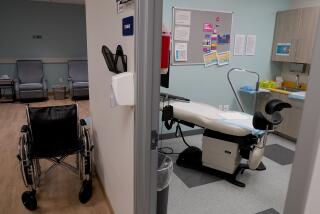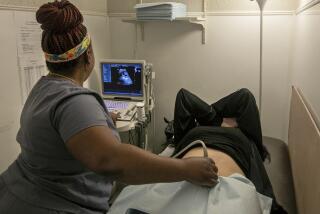‘House’ episode goes for the gut
“House,” Fox, season premiere, Sept. 16, “Dying Changes Everything.”
The premise: Lou (Christine Woods), a 37-year-old executive assistant in a women’s advocacy group, hallucinates at a business meeting that ants are crawling over her. She is brought to Princeton-Plainsboro Hospital, where Dr. Gregory House (Hugh Laurie) and his investigative team discover that she is anemic, has a low heart rate and is suffering from abdominal pain. She begins to bleed from her rectum, but both an upper endoscopy and a colonoscopy (to look for the source of the bleeding) are negative.
She is found to have a positive pregnancy test (HCG), but an ultrasound test performed at the bedside doesn’t show a fetus either in the uterus or the fallopian tubes. House moves the ultrasound probe up to the abdomen and discovers the at-least 8- to 12-week fetus attached to Lou’s large intestine. He reports that her low heart rate is from the “fetus pushing on the vagus nerve.”
“Fetuses have been transplanted before,” says Dr. Rema “Thirteen” Hadley (Olivia Wilde), but House cautions that the surgery is risky enough already, and that reimplanting the fetus “is a fantasy.”
Lou decides to have the fetus aborted. She is taken to the operating room and the fetus is removed, but Lou suffers a hemorrhage from the bowel. Her blood pressure drops, necessitating several blood and platelet transfusions. Ultimately, she survives.
The medical questions: How common is an abdominal pregnancy? How would it occur? Would removing the fetus cause a life-threatening intestinal bleed? Could the fetus be reimplanted in the womb or successfully delivered if gestation is more than 26 weeks? Is an abdominal pregnancy associated with hallucinations?
The reality: Abdominal pregnancy is rare and life-threatening. It occurs in about 1 in 10,000 pregnancies, when an ectopic or extrauterine gestational sac finds its way beyond the fallopian tube into the abdominal cavity, where it attaches to the bowel or omentum (the fatty sheath over the bowel), to the wall of the pelvis, onto an ovary, or to the broad ligament that anchors the uterus in the pelvis.
Abdominal pain is a common symptom, though normally it wouldn’t occur until 26 weeks gestation. Pressure on the vagus nerve could indeed lower the heart rate. A bleed from the bowel would also be possible, according to Dr. Khalil Tabsh, chief of obstetrics at UCLA Medical Center and School of Medicine.
Tabsh also confirms that removing the fetus could cause a life-threatening bleed from the bowel. “Early in the pregnancy, the fetus might be reimplanted in the womb, and if it is more than 26 weeks it could be removed and survive,” Tabsh says.
He recalls a similar case from his own obstetrics training in which a fetus that was “almost full term was attached to the bowel and was removed and survived. The mother required multiple blood transfusions because of bowel damage, but survived also.”
Tabsh says that the show’s handling of the problem is realistic, with one exception.
“If the fetus is at an early stage, it could be terminated by injection with potassium chloride and the placenta mummified with methotrexate before surgery is performed.” This pre-treatment would make surgical complications such as extreme bleeding less likely because the dead placenta and fetus would no longer be drawing a blood supply from the bowel.
Finally, abdominal pregnancy is not associated with hallucinations.
Lou turns out to also have contracted diffuse lepromatous leprosy during her travels, which can present with visual hallucinations (Charles Bonnet syndrome). Though leprosy is very rare in the U.S., there are still more than 600,000 cases worldwide. “Leprosy and an unrelated abdominal pregnancy at the same time is very unlikely but not impossible,” Tabsh says.
--
Dr. Marc Siegel is an internist and an associate professor of medicine at New York University’s School of Medicine. He is also the author of “False Alarm: The Truth About the Epidemic of Fear.” In The Unreal World, he explains the medical facts behind the media fiction. He can be reached at marc@doctorsiegel.com.
More to Read
The complete guide to home viewing
Get Screen Gab for everything about the TV shows and streaming movies everyone’s talking about.
You may occasionally receive promotional content from the Los Angeles Times.






